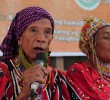“God forbid,” says one of my professors in the master’s program while stressing the current political trajectory of the Philippines, given the increasing influx of Chinese citizens to our country. She recalled clearly how the Japanese had dominated parcels of areas in our country before their invasion; how some of them went uncover as barbers, farmers, etc. But when Japan was ready to conquer our islands, those Japanese who have mixed with unsuspecting communities emerged as military generals and officers. Then, history can attest for what happened afterwards.
Given her old age and wisdom, I have felt both fear and hope for our country from what she shared. The former is intensified by the fact that most of the Chinese have occupied vast areas of our country, acquiring real estates, and seizing jobs from Filipinos. The latter emanates from what our professor had raised as an inquiry: why the youth isn’t participating enough?
In some of my engagements that put emphasis on intergenerational dialogues, especially in discourses about the ill-effects and traces of late Marcos’ Martial law, I can always hear the elders pleading among the youth to never disregard what we can learn from the past. The injustices and oppressive tactics, as they reflect, can only change its forms and means – more tamed and convenient – but their effects to our freedoms and democracy are still as traumatic and inhumane as before.
At present, we can’t deny how the perpetuation of fake news becomes rampant and unstoppable; how unjustified arrests and killings of journalists terrorize our entitlement of voice; how due process is undermined by our own government. In these matters, it seems that our youth is trapped in the spectacle of entertainment – of patronizing shows that intend to humiliate people in national television – but when asked about state affairs, they either say nothing or say something wrong.
The problem, moreover, is that most of our youth just want to indulge in the convenience of having a “middle mindset”. Despite the staggering statistical data and stories from the ground about the adverse effects of extrajudicial killings and collateral damages from questionable police operations; politicians who have been convicted of graft and corruption, plunder, and betrayal of public trust still hold high positions in the government; depressing conditions of the poor deepened by the increased prices of basic commodities – our youth, even student leaders in universities, don’t want to make a stand.
In Davao, when you ask anyone from the youth sector about a particular societal issue, the replies come in similar fashion: the government is doing its best. Given this generic and monochromatic response, it’s difficult to engage with the youth because most of them are afraid to be critical of a government led by someone who has affected their lives deeply. I believe that the danger of using one’s emotions in exchange with reason is the fallibility of logic.
As citizens of one nation who are direct recipients of our government’s lapses and misguided decisions, we should never be contended with trusting our government. Trust, without criticizing the wrong ways of achieving and sustaining it, is mere idolatry.
Probably, my professor is right when she intently pointed out that the youth should be our nation’s first line of defense. We should be the most afraid of what the future brings to our country. Maybe, she is old enough to care. But her words are certainly experienced enough to matter.
I believe, it’s justified to continuously ask what’s wrong with the status quo. And we should never be silent during instances when the government gives in to the interests of the powerful, oppressive, and colonizing. In these troubled times, when we are confronted with crucial decisions (Charter Change, re-imposition of death penalty, non-binding agreements with China, etc.), the “middle” mindset dilutes our capacity to ensure our democracy, our nation’s interests, and our future.
The moment we are stuck in the middle, there is no way out. And the trap is primarily psychological – it makes our capacity to think and act critically, stale and fear-driven.
Jupiter D. Cabig Jr. is currently a first year MA Development Studies student of Ateneo de Davao University. During his undergraduate years, he was the editor-in-chief and features editor of Atenews, the official student publication of Ateneo de Davao University. Right now, his energies are focused mainly on youth empowerment and development, human rights, and writing. He has a mixed-breed dog named Foucault.










